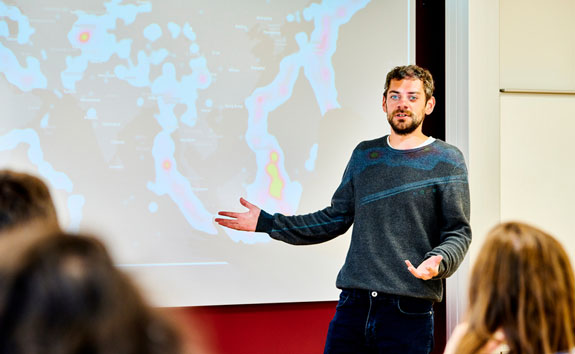Training in Climate and Environmental Resilience
Training that addresses the climate emergency.
Help meet the need for resilient societies and ecosystems
Build your career around our CCER goals, expand your climate literacy and become an expert within our research team, and develop solutions to help adapt to the climate and environmental emergency.
Our training equips students to address the challenges of climate and environmental change.
Training opportunities are available for undergraduate, postgraduate and professional learners. They will meet the need for resilience in human and natural ecosystems in the future.
Leading academics deliver the training and ensure it is relevant and accessible by:
- collaborating with industrial partners, practitioners and wider society
- working with national agencies
- providing state-of-the-art laboratory and field sites
We can also deliver the training through CPD courses. The opportunities listed are just examples, you can search the full list of Newcastle University courses here.
Our undergraduate programmes
Newcastle University offers a wide range of undergraduate degrees. Climate and environmental sustainability is a topic in many of our courses, including:

Our MSc postgraduate programmes
Our postgraduate and professional training aims to address the challenges of climate change. Leading academics deliver them in collaboration with industrial partners and practitioners. Our postgraduate courses and research equip students to address these global challenges.
Our research helps to shape the content of the courses below.
MSc Hydrology and Water Management
Our MSc Hydrology and Water Management enables students to understand water sector challenges. You will learn about water management and addressing global issues including climate change, urbanisation, and food and water security.
You will also broaden your understanding of policy and practice, as well as taking part in fieldwork and using state-of-the-art tools. All this will equip you for a career in the water industry.
Find out more about the MSc Hydrology and Water Management.
MSc Environmental Engineering
Environmental engineers create the infrastructure and technologies for a sustainable society. You will learn how to apply scientific and engineering principles. In doing so you will protect the environment and public health.
This includes providing clean water, treating wastewater and remediating pollution from industry. You will also learn how to control air pollution. The course incorporates climate change and the circular economy.
Find out more about the MSc Environmental Engineering.
MSc Wildlife Management
This course is suitable for those wishing to link the theory and practice of wildlife management together.
Wildlife Management will focus on UK and EU policy, enabling graduates to go on to work in a range of roles and countries
Modules cover, for example:
- wildlife disease and epidemiology
- global conservation
- invasive species
- policy and licensing
- GIS
- remote sensing
- coupled human-natural systems
Students will also develop practical skills in:
- wildlife monitoring
- surveying
- tracking
- data collection
- data analysis
Find out more about the MSc Wildlife Management.
International Marine Environmental Consultancy (IMEC) MSc, PGDip
This International Marine Environmental Consultancy (IMEC) course brings together core ecological skills and the business elements required to compete in this growing sector.
As this is an interdisciplinary course, students enrol with a range of background skills but have an interest in marine environment and its management.
Modules cover, for example:
- policy and licensing
- GIS and remote sensing
- coupled human-natural systems
- marine ecosystems
- marine consultancy
- environmental impact assessments
Find out more about IMEC.
MSc Agriculture and Environmental Science
You will develop your understanding of the interaction between agriculture and the environment. There is an emphasis on sustainability and the ecological consequences of poor management. The course gives you skills in sustainable farming, environmental management and rural development. These are crucial skills in the climate emergency.
Find out more about the MSc Agriculture and Environmental Science.
Executive Master of Business Administration (MBA)
Newcastle University Business School has partnered with NETpositive Futures to develop responsible leaders. We will achieve this through our part-time Executive Education programmes. They include the Exec MBA, MSc Strategic Leadership, and MSc Coaching and Mentoring.
The unique programmes bring together pedagogy, technology and knowledge. Learners explore the UN's Sustainable Development Goals over the two years. They also:
- explore global sustainability challenges
- generate action plans
- measure impact
These courses develop leaders who understand their impact on society and the environment.
Find out more about the Executive Master of Business Administration (MBA).
MSc Renewable Energy, Enterprise and Management (REEM)
This multi-disciplinary MSc is for both practising professionals and graduates. Students will learn how to expand renewable energy development. They will learn how to apply management, planning or business skills to do this.
A wide range of modules are available, including:
- Energy Management
- Policy Politics and Ethics
- Environmental Impact Assessments
- Photovoltaics
- Introduction to Hydro, Wind, Wave and Tidal Energy
This course prepares students for a wide range of careers across the globe.
Find out more about the MSc Renewable Energy, Enterprise and Management (REEM).
MSc Urban Planning
This course is accredited by the Royal Town Planning Institute (RTPI). Urban Planning is the understanding of the place-making processes. It's the process that underpins places, society and the environment. It's also interdisciplinary, with professionals having an understanding across a range of topics. These include Conservation and Green Infrastructure.
Find out more about the MSc Urban Planning.
NERC ONE Planet DTP
ONE Planet offers a Doctoral Training Partnership (DTP) at Newcastle and Northumbria Universities. The Natural and Environmental Research Council (NERC) funds the partnership.
Students develop multi-disciplinary research across:
- climate and climate change
- earth system processes
- environmental informatics
- anthropocene
Students work with our partners. They provide professional skills and attributes required for our new leaders of:
- academia
- industry
- business start-ups
- NGOs
- government
Find out more about the NERC ONE Planet DTP.
NERC IAPETUS DTP
IAPETUS is a multidisciplinary DTP. The NERC funds and accredits the partnership. It provides PhD students with the opportunity to collaborate with experts from a range of external research institutions, alongside Newcastle University. The IAPETUS funds projects that tackle global environmental change and explore sustainable resources. Multi-disciplinary teams drive the scheme.
Find out more about the NERC IAPETUS DTP.
EPSRC Centre for Doctoral Training in Water Infrastructure & Resilience (WIRe)
Water infrastructure is critical to our society. It allows us to derive benefits from water, and it manages risks from water hazards including wastewater, floods, droughts and pollution.
Climate change has caused recent water infrastructure failures. This has provided a strong reminder of the need for resilient water systems. Our Centre for Doctoral Training provides a training programme for researchers. They aim to make water infrastructure resilient to the effects of:
- climate change
- population growth
- changing water quality
- regulation
Find out more about the EPSRC Centre for Doctoral Training in Water Infrastructure & Resilience (WIRe).
EPSRC and other DTPs Doctoral Training Centres and Partnerships
The Engineering and Physical Sciences Research Council funds Doctoral Training Partnerships at Newcastle. These contribute towards our CCER goals. The partnerships cover areas including:
- big data
- renewable energy
- water infrastructure and resilience
- agri-food innovation
Find out more about the EPSRC and other DTPs Doctoral Training Centres and Partnerships.
CPD
Newcastle University offers various short Continuing Professional Development (CPD) courses (in-person and online). These enable professionals to connect with our experts and themes, and they enable learners to tailor their careers. Our CPD courses allow professionals to apply this new knowledge in the workplace.
CCER modules for non-environmental degrees
Students studying for non-environmental degrees can take modules relevant to the CCER. These might include, for example, a Geophysical Fluid Dynamics module. Students from the School of Mathematics, Statistics and Physics can take this module. It would allow them to apply their skills in the context of the oceans and atmosphere.
The Business School also offers various related modules under its Executive Education programmes. They include:
- climate leadership
- resilience framework
- environmental responsibility
The opportunities listed are just examples, you can search the full list of Newcastle University courses here

